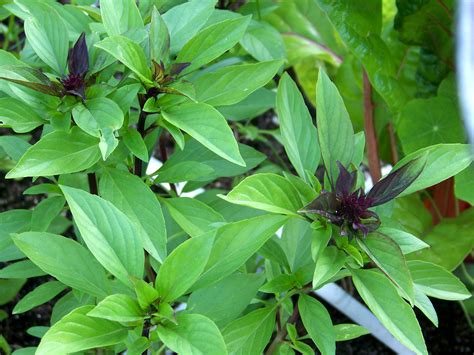by Lori Alton; NaturalHealth365
For millennia, holy basil – or tulsi – has been revered in the Ayurvedic medical system for its healing capabilities. Scientifically known as Ocimum sanctum, holy basil is currently earning respect from modern researchers for its abilities to alleviate the effects of chronic stress – while inhibiting the growth of cancer.
Today, we’ll focus our attention on the many health benefits of this therapeutic plant.
Holy basil is the ultimate adaptogen for every day use
To be classified as an adaptogen, a substance must strengthen the immune system, help the body function optimally during times of stress and even help prevent diseases such as cancer. Holy basil, with its antioxidant, anti-inflammatory and immune-enhancing effects, does this in spades.
But, be aware: holy basil is not to be confused with “sweet basil,” or Ocimum basilicum, the flavorful and beneficial Mediterranean kitchen herb sold in grocery stores. Holy basil – sometimes called “Asian basil” – is a plant of Indian origin, and features some different constituents and properties.
Holy basil works on cellular and molecular levels to fight disease
In cellular studies, holy basil has shown the ability to repair cells damaged by oxidation – and even to repair cell DNA damaged by radiation, giving it chemopreventive effects. One of its compounds, BCP, or (E)-beta-caryophyllene, acts as a strong anti-inflammatory agent.
In fact, researchers say that holy basil, much like pharmaceutical anti-inflammatory drugs, works to suppress levels of the pro-inflammatory chemical COX-2, helping to relieve pain and inflammation – but without unwanted side effects.
In addition, holy basil can help alleviate stress-induced anxiety, depression and insomnia. University of Maryland Medical Center talks about this calming herb as a therapy for post-traumatic stress disorder, and many integrative physicians recommend it for adrenal support.
Research confirm the stress-relieving effects of holy basil
As scientists have long known, the effects of ongoing stress can be devastating. Chronic stress damages the nervous system, suppresses the immune system, and can even cause increased appetite and weight gain. When it comes to relieving effects of stress, holy basil just might be the “gold standard” of soothing herbs.
Holy basil has been shown to decreases levels of stress hormones – corticosterone and cortisol in particular. Having lower levels of corticosterone can improve mental function, while reducing risk of age-related mental disorders.
In a 2012 study, holy basil increased levels of beneficial dopamine and 5-hydroxytryptamine, or serotonin, in rats that were exposed to noise stress. Researchers noted that holy basil was 39 percent more effective than placebo in relieving stress symptoms – a significant result.
In a study published in 2005 in Journal of Ethnopharmacology, a holy basil extract was given for 7 days to rats that were then subjected to noise stress. Results showed that the treated rats did not experience the noise-induced, detrimental lowering of brain acetylcholine, and the raising of acetylcholinesterase, that characteristically follows exposure to noise stress – demonstrating the protective effects of this herb.
Researchers call for more exploration of holy basil’s exciting anticancer effects
Holy basil is packed with powerful antioxidants such as eugenol, apigenin, luteolin, rosmarinic acid, and beta-sitosterol. Interestingly enough, researchers have found that holy basil can not only suppress the proliferation of cancer cells, but can also induce apoptosis – or cell suicide – in malignant cells.
In a study published in Journal of Ethnopharmacology, holy basil seed oil caused a significant reduction in the size and incidence of laboratory-induced tumors in mice. It improved activity of natural antioxidants such as superoxide dismutase and glutathione, leading the team to note that the oil had chemopreventive effects that were likely caused by its potent antioxidant properties.
In a recent study published in Nutrition and Cancer, researchers found that several of holy basil’s constituents, including eugenol, rosmarinic acid, luteolin, beta-sitosterol and carnosic acid, prevented chemically-induced cancers of the skin, liver, mouth and lungs. Holy basil’s multiple methods of action against cancer include increasing antioxidant activity, altering gene expressions, inducing apoptosis, inhibiting the formation of new blood vessels to feed tumors, and preventing cancer’s metastasis, or spread – quite an impressive array of cancer-fighting effects!
In addition, two holy basil flavonoids – orintin and vicenin – were found to protect against the tumor-forming effects of radiation, while protecting cell DNA from damage. Naturally, the team called for more research to establish holy basil’s use in cancer prevention and treatment.
How should I take holy basil?
Holy basil is available in capsule form. Look for a standardized formula that contains eugenol, caryophyllene and triterpenoic acids. To avoid risk of contamination with heavy metals, some natural health experts warn against buying holy basil from China.
Many herbalists and natural healers recommend taking 400 mg of the standardized extract a day, but naturally check first with your doctor, as holy basil has anticoagulant effects and may interact with some medications or nutritional supplements.
You can also brew holy basil root into a tea, or use the tangy, somewhat peppery-tasting leaves to jazz up soups or salads and add spice to casseroles. The leaves are strongly flavored, so experimentation may be in order to avoid overwhelming other flavors in the recipe.
Soothing and adaptogenic, holy basil can help ease depression, anxiety and insomnia, while helping to protect against cancer. This beneficial herb, long revered in traditional healing systems, is finally beginning to get its due as a cutting-edge stress-reliever and chemopreventive substance.
READ MORE Suffering From Insomnia Confession or How I Learned to Sleep
Sources: Adrenaladvice.com; Medicinehunter.com; NIH.gov; NIH.gov; NIH.gov


